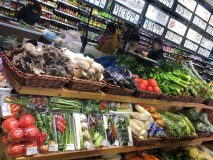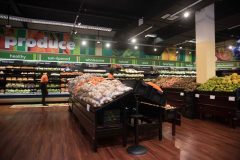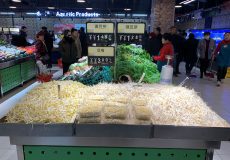by the Independent Grocers Alliance (IGA)
Did you hear the news? IGA has handpicked 13 IGA Best Practices for their creativity, ability to save money/increase sales, and adaptability by fellow retailers. Now it’s up to the industry to vote for the best. When all the votes are in, the top three will be announced at the IGA Global Rally Awards of Excellence Brunch on Sunday, Feb. 24, and each will take home a $1,000 cash prize for the store.
Vote as many times as you want before midnight, Saturday, Feb. 23, to ensure your choices make the winning three, and be sure to recruit your friends and colleagues to do the same!
Can’t decide? Tune in to our Facebook page on Saturday to see their live presentations.
Now’s let’s meet some of our finalists…
 Sprankle’s Neighborhood Market IGA, Doug and Randy Sprankle
Sprankle’s Neighborhood Market IGA, Doug and Randy Sprankle
Store-made hoagies become a community’s preferred fundraising tool
With a number of non-profit organizations in their community looking for fundraising support, Sprankle’s Neighborhood Market IGA needed a unique way to help. They created a hoagie fundraiser program, offering non-profits the opportunity to resell Sprankle’s well-known hoagies and keep 50 percent of the profits. Thanks to this partnership, Sprankle’s has increased their hoagie sales by 40 percent while watching their community grow and prosper.
 Schild’s IGA, Kevin Schild
Schild’s IGA, Kevin Schild
Turn two annual events plus weekly tastings into a 20 percent increase in annual wine sales
When Schild’s IGA wanted to take their wine department to the next level, they purchased a tasting license and started offering a weekly wine tasting. The tastings, held on Fridays from 3-6 p.m., were so successful in sales that they paid for the initial $500 licensure fee after just one week. Fast forward a year, they are now hosting larger ticketed events complete with store-made food and vendors sampling 16-20 bottles. The events are such a hit, the store has tripled their selling space for wine and are still seeing a 20 percent surge in wine sales, equaling more than $9,000 per month.
 Jiayuguan Western Horizon Commerce and Trade Co., Ltd., Zhe Zeng
Jiayuguan Western Horizon Commerce and Trade Co., Ltd., Zhe Zeng
Compact stores and at-home delivery spark daily sales in fresh foods
Northwest China’s cook-at-home tradition, compact refrigerators, and desire for fresh vegetables mean most people have to shop for groceries daily, but clustered neighborhoods, narrow roads, and limited parking spaces make daily driving to big supermarkets difficult. Jiayuguan Western Horizon Commerce and Trade Co. came up with a two-part strategy to make grocery shopping easier for these communities: 1. They built compact stores within five-minutes walking distance; and 2. utilized the public app, WeChat, so customers could avoid travel altogether, and instead place an order through the app for delivery within 15 minutes. Even though the stores themselves are small—at just 900 square-feet—Jiayuguan Western Horizon Commerce and Trade Co. is able to use their larger stores as a distribution hub and contracts with a network of local growers to stock the stores with over 60 percent of SKUs in fresh, meaning they have the fresh products their shoppers want and they are not limited by the physical size of the store.
 The Massy Stores LTD., Sariah Best-Joseph
The Massy Stores LTD., Sariah Best-Joseph
St. Lucia stores take a risk with green technology that pays off
While sustainability is becoming increasingly important in all areas of the world, island-based retailers like The Massy Stores LTD. know better than most how important it is make positive change. Over the course of six years, The Massy Stores LTD. in St. Lucia have been remodeling their stores to become more energy efficient. Through the installation of LED lights, efficient refrigeration and HVAC systems, and solar PV systems (technology that is new to retailers in the Caribbean), six out of their 11 stores are now completely modernized with sustainable best practices resulting in significantly reduced energy expenses, improved food safety, and a better shopping experience for customers. To date, the cost effectiveness of the redesigns has led to a $260,000 energy cost savings, and huge thumbs up from environmentally conscious customers.
 Hebei Hui You Commercial Chain Development Co., Ltd., Zhe Zeng
Hebei Hui You Commercial Chain Development Co., Ltd., Zhe Zeng
Winning shopper trust with tiny bean sprouts
In Chinese cuisine, bean sprouts are very popular but extremely perishable and prone to contamination, with many growers cutting corners by adding fertilizers or using poor-quality water. Hui You Group in Baoding, China decided to build their own automated sprouting line, ensuring they could offer shoppers a safe, quality product while gaining their trust. And since bean sprouts are seldom served alone, securing shopper’s bean sprout purchases has resulted in a sales increase of more profitable foods such as pork, beef and mutton.

